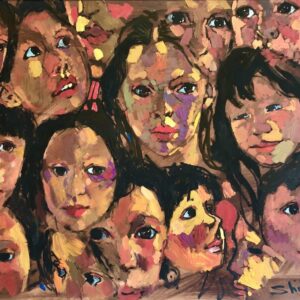
By Iloradanon Efimoff
“Don’t you go to school for free?”, “You don’t pay taxes!”, “Do you live in a teepee?” are things Indigenous students have heard.
In some cases, there is widespread agreement on what racism is. For example, most people would agree that restricting a racial group’s right to vote in a federal election is racist. (Indigenous people were the last to gain full voting rights in Canada in 1960.)
But in other cases, the agreement is scant _ the quotes at the top of this page represent some of those cases. They are examples of racial microaggressions. Racial microaggressions are often considered “minor.”
What are racial microaggressions?
Racial microaggressions are incessant, subtle forms of racism that can be verbal, behavioural or environmental. Racial microaggressions have been described as “racial indignities.”
As a mixed-race Haida woman, I’ve been routinely told I “don’t look Indigenous” or I’m “not like other Indigenous people” because I was born with my mother’s skin tone instead of my father’s. This is an example of a racial microaggression.
Microaggressions may seem small or “micro,” but as incessant forms of racism, they can have big impacts on mental health, physical health and social life.
One study of university students found that non-Indigenous university students regularly asked Indigenous university students if they lived in teepees. Another study found that Indigenous students were stereotyped by others as drunks, addicts or on welfare.
Daily hassles
One way of looking at the impact of racial microaggressions could be to look at daily hassles. Daily hassles are defined as “relatively minor, everyday problems such as commuting problems, family arguments or household repairs.”
The cumulative impact of daily hassles is linked to chronic health conditions like digestive problems, mental health conditions like depression and anxiety and even death. Some researchers have even found that daily hassles have a larger impact on health than major life events given their relentless nature.
The concept of daily hassles show that small things can have big impacts.
Racial microagressions and health
Researchers have shown that racial microaggressions are associated with depression in Latino community members, in university students of Asian descent and create PTSD symptoms in Black participants. Microaggressions are also related to physical health outcomes. Experiencing racial microaggressions during the COVID-19 pandemic was related to physical health issues and sleep troubles for Asians and Asian Americans.
They’re also associated with a whole host of other negative outcomes like substance use, anxiety, stress and even suicidal thoughts in many racialized groups.
Although there is little quantitative research on the impacts of microaggressions on Indigenous people, qualitative research has indicated that Indigenous people feel disrespected, degraded, uncomfortable or like they have to hide their Indigenous identity after experiencing microaggressions.
Microaggressions aren’t just based on race
Microaggressions can be based on many factors. Researchers have identified microaggressions based on gender, LGBTQ identity and ability.
Experiencing microaggressions based on these other factors can have similar effects as racial microaggressions: for example, experiences of disability-related microaggressions were related to higher levels of anxiety in Canadian university students.
A person can experience multiple types of microaggressions, due to the intersectionality of their identities.
For example, an Indigenous woman who identifies as bisexual might experience race, gender and sexual orientation-related microaggressions all in one day. Based on research on the impact of microaggressions and daily hassles, it is likely these combined experiences have negative impacts.
What to do about them?
What can people do about microaggressions? Freelance writer Hahna Yoon wrote a piece in the New York Times on how the targets of microaggressions might respond. These discussions are important because microaggressions exist and targets of them must have coping mechanisms. For example, people who experience microaggressions might share their experiences with others who have common experiences as a way to cope.
However, focusing on the target’s response misplaces the burden. A more equitable approach would be to put the onus of addressing microaggressions onto the perpetrators of the microaggressions. But there is relatively little research on this.
One study found that white participants said they were less likely to engage in microaggressions after a day-long workshop on race, racism and racial microaggressions. The study provides hope to those who do this work, but more information is needed.
Microaggressions cause harm. More research needs to be done to understand how best to prevent them. Thinking about how words matter might be a good place to start.






